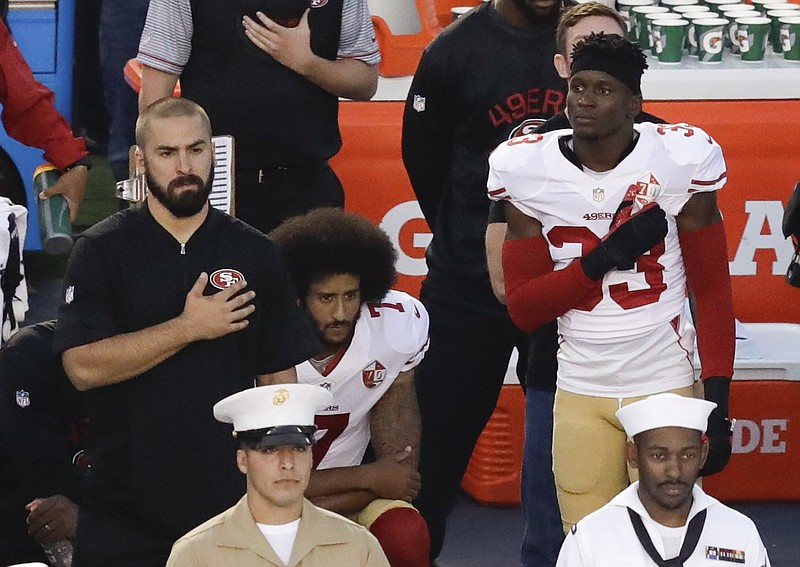Many Americans continue to have difficulty separating truth from fiction when it comes to the daily news.
Social media, 24-hour news networks and our poor attention spans are at least parts of the problem. We're quicker to trust a late-night talk show host, a Facebook post and an overheard conversation than we are to test the truth for ourselves.
We believe that's what has caused the flow of so much misinformation during the first seven months of the Trump presidency. The hate left over from the shocking election results and the president's own Twitter bombast don't help, either.
In recent weeks, the misinformation only has exacerbated race tensions and expectations heightened during the previous presidential administration. We wonder where this will end, but we're certain that it can be dialed back if people began to think more on their own again and not buy into dangerous crowd-think.
Examine the following, for example, to see where your knowledge lies:
The Spin: Protests work. University of Missouri students were ahead of the curve in their 2015 protests over race, workplace benefits and leadership. The protests resulted in Chancellor R. Bowen Loftin ordering diversity and inclusion training for students and faculty in 2016. The protesters were not satisfied, and varsity football players announced they wouldn't play until University System President Tim Wolfe was removed. Wolfe resigned. Problem solved.
The Results: Protests can be costly. Freshman enrollment at the University of Missouri is down 35 percent since the protests, and the school is beginning the year with its smallest freshman class since 1999, according to the university. The school announced in May it would lay off as many as 100 people and eliminate more than 300 positions. That followed 2016 cuts in library, cleaning and maintenance jobs. The school also has taken seven dormitories out of service. "The general consensus," said new System President Mun Choi, "was that it was because of the aftermath of what happened in November 2015."
The Spin: Colin Kaepernick - patriot. The former San Francisco 49ers quarterback kneeled during the national anthem during the team's final 2016 preseason game - and all subsequent season games - to protest perceived injustices by police against minorities in the United States. Various National Football League players followed his lead and took a knee. The national media and left-wing politicians praised his move, proclaiming that the gesture by an athlete making millions of dollars was a perfectly acceptable way to highlight the issue.
The Results: Colin Kaepernick - unemployed. The former quarterback already had lost his job as a starter but during the 2016 season subsequently lost his job as a backup. In March, he opted out of his contract. With the NFL starting its 2017 season next week, he has not found a job. Critics cite his inconsistency; supporters say he is not employed because of his protest gesture. In a recent J.D. Power poll, 26 percent of respondents said they watched fewer NFL games in 2016 because of the protests.
The Spin: Rust Belt regrets Trump vote. In a recent NBC/Marist poll of Rust Belt states, President Donald Trump's job approval ratings were under 40 percent, only about a quarter of respondents said they were proud of him and broad majorities said they were embarrassed by him. If the election were held today or if he were seeking re-election today, pundits have said, his chances would be next to nothing.
The Results: Rust Belt may not regret Trump vote. Wisconsin, Michigan and Pennsylvania all voted for Trump in the 2016 election. Wisconsin had last voted for a Republican in 1984, and Michigan and Pennsylvania last voted for the GOP in 1988. However, Trump's favorable ratings in the states today are very similar to what they were when he was elected. If the national media should have learned anything about Trump from the 2016 election, it is that people might support him or vote for him but may not necessarily tell pollsters they are going to do so.
The Spin: Border walls don't help. Open borders advocates said 2016 presidential candidate Donald Trump shouldn't propose any more walls across the U.S.-Mexico border - that the government wouldn't be able to stem the tide and we should allow all who want to come into the country anyway.
The Results: Border walls help. At the Border Patrol's Yuma Sector, which was built as part of 700 miles of fencing erected during the presidency of George W. Bush with bipartisan support from Democratic Sens. Barack Obama, Hillary Clinton and Joe Biden, illegal immigration fell 90 percent, property crimes fell, migrants who died attempting to cross the border fell, and assaults on Border Patrol agents fell from 37 in 2005 to seven last year. Overall illegal immigration across the Southern border is down as well.
Ask yourself which of the above you've heard more, the spin (rumors, half-truths, innuendos and outright lies) or the results. If it's the spin, do yourself a favor and adjust your information sources. If you don't, you may continue to be a part of the problem and not the solution.
